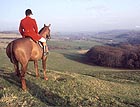Police to stop monitoring hunts
The ACPO suggests that monitoring hunts and enforcing the ban is not a top priority for police officers


Police forces will stop monitoring hunts in a change of policy that could seriously undermine the controversial hunting ban. The Association of Chief Police Officers (ACPO) has admitted that gathering evidence of illegal hunting is difficult, that the ban is hard to enforce and that chief constables have more pressing priorities.
ACPO suggests gaining information from anti-hunt activists in future, but urges forces to be ‘very cautious’ when dealing with such groups as hunting is an ‘emotionally charged’ subject.
Hunts will no longer be required to inform police in advance of the time and place of their meets and planned route. Senior officers have previously expressed concerns that they had been forced to release details of meets through freedom of information requests to activists who had gone on to disrupt hunts.
Richard Brunstrom, chief constable of North Wales and ACPO spokesman on rural affairs, says: ‘Hunting is definitely not a policing priority. It is not illegal to wear a red coat and ride a horse in a public place.
‘If there are offences, they’re likely to be taking place in a remote rural environment. We’re not very well equipped to follow hunts and get evidence and nor do we think we can justify it. Pursuing hunts is an expensive and sophisticated operation.’
A spokesman for the League Against Cruel Sports says: ‘Although we accept it is not a high priority for the police, a ban was the will of Parliament and is the will of the people. We are going to press for more prosecution cases to be brought.’
The Countryside Alliance says: ‘We’ve always understood what a difficult job the police have in dealing with such a confusing piece of legislation. But guidance suggests that the sort of engagement some police forces have had with animal rights groups should, quite rightly, be avoided.
Exquisite houses, the beauty of Nature, and how to get the most from your life, straight to your inbox.
The Hunting Act came into force in 2004, following 700 hours of parliamentary discussion. Since then, there have been eight prosecutions, of which only three have been successful.
Conservative leader David Cameron has made it clear that he favours a repeal of the Act, and, in the event of a General Election victory, would offer MPs a free vote in government time.
To comment on this article, use the comment box below, or email us at clonews@ipcmedia.com. Read more about the countryside
Country Life is unlike any other magazine: the only glossy weekly on the newsstand and the only magazine that has been guest-edited by His Majesty The King not once, but twice. It is a celebration of modern rural life and all its diverse joys and pleasures — that was first published in Queen Victoria's Diamond Jubilee year. Our eclectic mixture of witty and informative content — from the most up-to-date property news and commentary and a coveted glimpse inside some of the UK's best houses and gardens, to gardening, the arts and interior design, written by experts in their field — still cannot be found in print or online, anywhere else.
